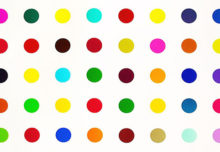Reasons to collect art. The 5 P’s.
Recent (February 2020) news told us that the 1967 painting ‘A Bigger Splash’ by David Hockney sold at a Sotheby’s auction for £23.1 million ($29.8 million). That is the third highest price paid at auction for a Hockney.
By contrast Van Gogh famously sold only one of his own paintings during his lifetime. Incidentally, almost his entire lifetimes work has now been acquired by national collections where it will probably remain. This means that the art market is denied access to more Van Gogh paintings forever, but millions of us can visit public art galleries and enjoy the art.
So, well done David Hockney, tough luck Vincent van Gogh.
…5 reasons to collect art, and the benefits of art ownership…
Pleasure.
The foremost reason for collecting art is undoubtedly the pleasure that fine art brings to the world.
Aesthetic pleasure that art lovers feel can come in many forms. The experience might be triggered by colour, texture, craftsmanship, skill, artistic message, design, date, nostalgia, quality, intellectual challenge, or some other aspect of the artwork.
The pleasure that art brings to a person, on the same wavelength as the artist, has been recognized and written about in countless tomes. There is even a condition called ‘The Stendhal Syndrome’ which is the condition of being dangerously overwhelmed by beauty in either art or nature.
Of course art is subjective. Something that one person likes will leave another person luke-warm, and vice versa. Art is so varied that most viewers will likely prefer a particular genre, subject, style, or artist.
So all artists have to accept that his or her collectors are probably a minority.
However an artist who has weathered any initial rejection can develop and thrive as he or she gets feedback from collectors. The pleasure that a successful artist gets from creating work is greatly influenced by the pleasure that it gives to collectors.
Prestige.
Interior designers and architects rarely leave walls empty. Stately homes are stuffed with portraits and landscapes saying so much about their owners. So it is with modern artwork in modern homes. An original painting, or a high quality print, shows the world that the owner has taste, influence and substance. The choice of art displayed can and does establish a collectors reputation.
Another factor is the prestige and reputation of the artist. This is recognised and valued by many collectors. The can benefit from the undoubted status that comes with their ownership of good, influential art by artists with a good following. It looks impressive on the walls of their homes, offices, boardrooms, yachts, etc. and they can share their enjoyment and influence with friends and visitors.
Patronage.
It is a fact that historically patronage has primarily come from the politically powerful, national collections, industrial giants, and international religious bodies. They have supported the visual arts for centuries. From Guggenheim to Venetian Doges, from Russian oil billionaires to the Tate Gallery, or even local businesses and council art galleries.
The rich and powerful have seen the influence that fine art has on design, invention, the economy, the culture and political identity of a nation, and more.
The individual private collector is also adding their voice to our cultural heritage. Investing in fine art is investing your influence into the future of your nation as well as your family.
Participation.
Another benefit that many art collectors get for their enthusiastic involvement is when they personally enjoy being part of, and influencing, the excitement of creativity within the art world.
Artists, writers and musicians, have always had the reputation for leading individual and stimulating lives. This is probably because the creative process uses the right side of the human brain. This area is where childhood play and exploration thrive in joyful discovery. Collectors share the artist’s excitement, and enjoy the company of other collectors, in a richer, deeper, more imaginative and colourful world.
Art has a tendency to grow on you. Exposure to a new unknown art-form or style is usually rather difficult at first. You have to get to know the language that the artist is using. That can take time and some artists don’t achieve recognition until late in their career or even after they die.
Profit.
The buyers that spend millions of pounds or dollars for art are surely attracted by the prospect of huge profits. No doubt one reason why the press and television programmes show interest in visual art is because the secondary art market at auction continues to do so well.
But that fact should not fool us into thinking that collecting or investing in art is only to do with potential profit. Instead we should be aware that there are other good reasons for the continuing popularity of fine art.
Summary;
Five benefits of art ownership.
- Aesthetic pleasure bonus.
- Status or prestigious position.
- Social contribution by patronage.
- Participation in the art world.
- Profit or gain from investment
Conclusion;
Please keep buying our art. You know it makes sense 🙂
****************************************************





